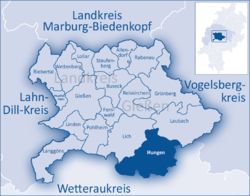Hungen
| Hungen | ||
|---|---|---|
| ||
 Hungen | ||
Location of Hungen within Gießen district  | ||
| Coordinates: 50°28′N 08°54′E / 50.467°N 8.900°ECoordinates: 50°28′N 08°54′E / 50.467°N 8.900°E | ||
| Country | Germany | |
| State | Hesse | |
| Admin. region | Gießen | |
| District | Gießen | |
| Government | ||
| • Mayor | Klaus Peter Weber | |
| Area | ||
| • Total | 86.75 km2 (33.49 sq mi) | |
| Elevation | 144 m (472 ft) | |
| Population (2015-12-31)[1] | ||
| • Total | 12,471 | |
| • Density | 140/km2 (370/sq mi) | |
| Time zone | CET/CEST (UTC+1/+2) | |
| Postal codes | 35410 | |
| Dialling codes | 06402 | |
| Vehicle registration | GI | |
| Website | www.hungen.de | |
Hungen is a town in the district of Gießen, in Hesse, Germany. It is situated 20 km southeast of Gießen, and 18 km northeast of Friedberg. Surrounding towns are Laubach to the north, Nidda to the east, Wölfersheim to the south, and Münzenberg and Lich to the west.
The history of Hungen dates back to 782. In 1806 it came under the sovereignty of the Grand Duchy of Hesse.
Buildings of interest include the Hungen Castle, the Evangelical Church, parts of the medieval city wall and Hungen station.
Hungen in the media
Literature
Shmuel Spector, Geoffrey Wigoder, The Encyclopedia of Jewish Life Before and During the Holocaust ISBN 0-8147-9356-8, New York University Press, 2001.
Film
My Opposition: the Diaries of Friedrich Kellner
- The railroad station of Hungen can be seen in this 2007 Canadian documentary, which recounts the story of Robert Scott Kellner and his grandfather, Friedrich Kellner, chief justice inspector of Laubach who wrote the anti-Nazi diary, "My Opposition."
See also
- Hungen (meteorite), for the Hungen meteorite (fallen in 1877).
References
- ↑ "Bevölkerung der hessischen Gemeinden". Hessisches Statistisches Landesamt (in German). August 2016.
This article is issued from
Wikipedia.
The text is licensed under Creative Commons - Attribution - Sharealike.
Additional terms may apply for the media files.
